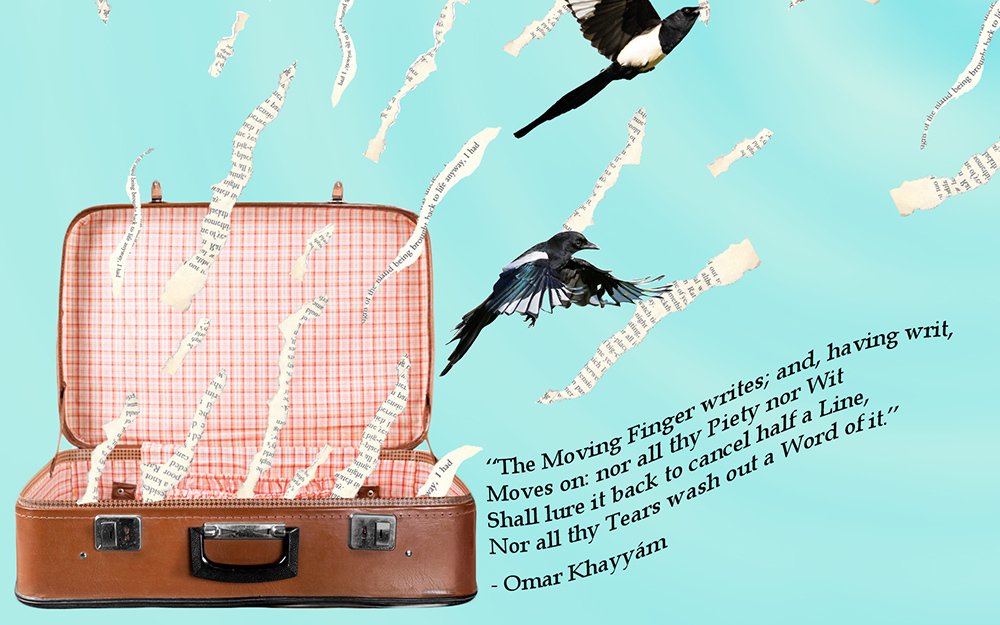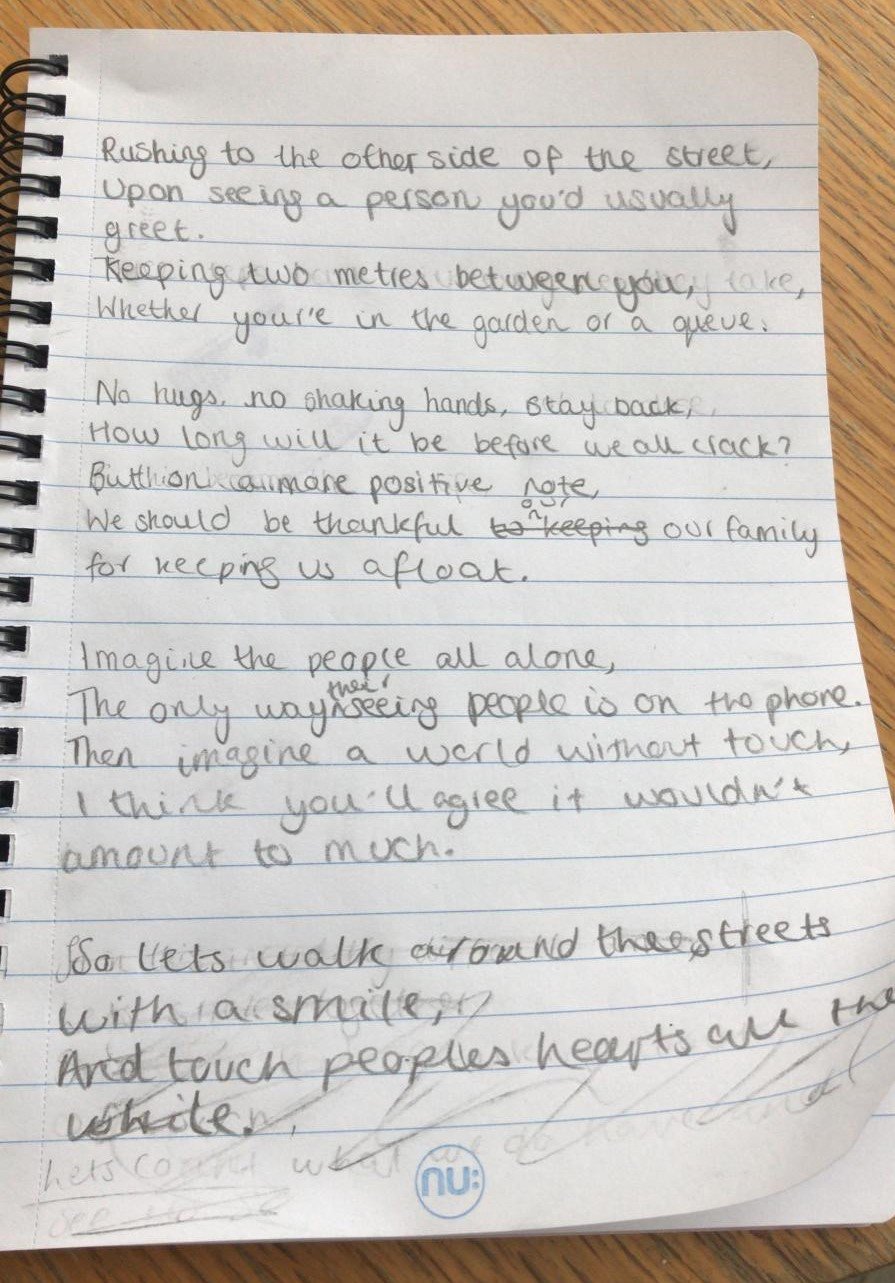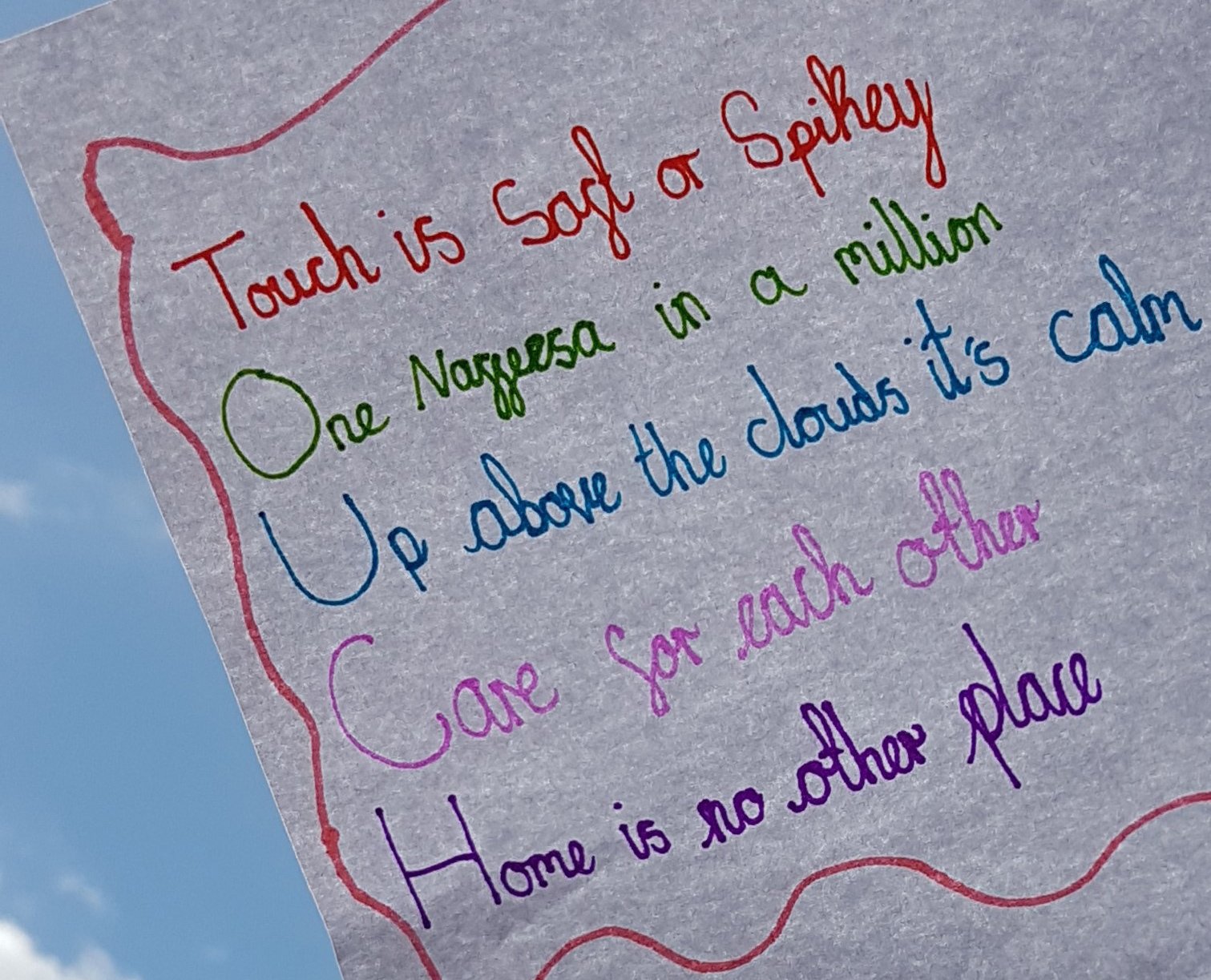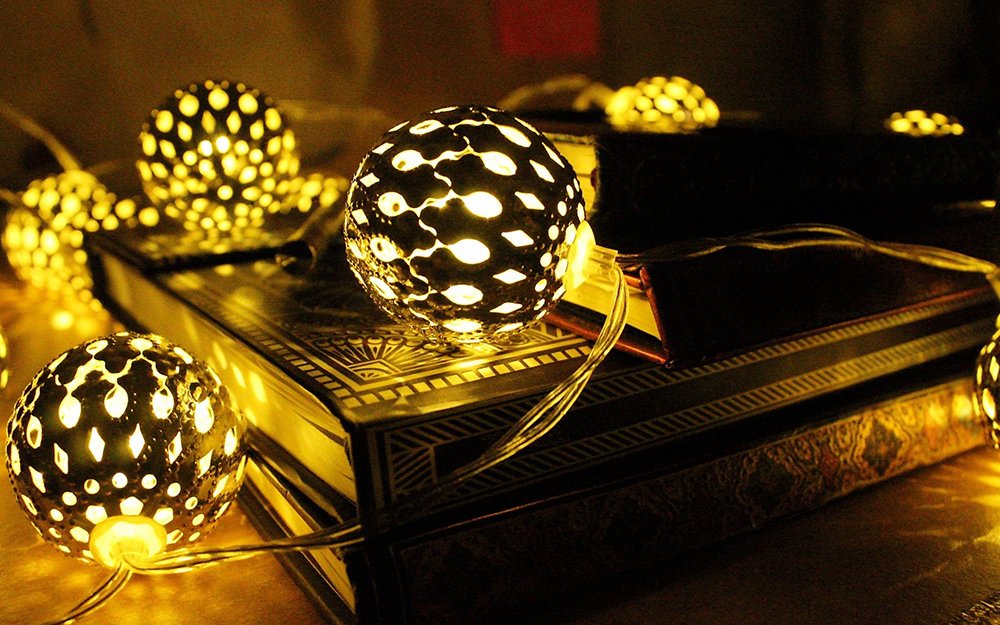Touchstone Tales — From Fragments to Fiction
Illustration by Ferdusi Jahan
Jul 20, 2020
Guest blog by Sudha Bhuchar, award-winning actor and playwright. Sudha is the winner of a co-commission from Revoluton Arts and Wellcome Collection exploring the theme of 'touch' in Bury Park through arts and creativity.
People often ask me about my ‘process’ when approaching my writing and I am reminded of a quote from Alan Bennett in his introduction to his Talking Heads 2 monologues collection:
‘A playwright is not the best person to talk about his own work for the simple reason that he is often unaware of what he has written’.
He goes on to talk about the metaphor of the playwright’s ‘baggage’. When attempting to walk nonchalantly with his suitcase through the green ‘nothing to declare’ channel at airport customs, he is stopped by officials annoyed at his swagger. When asked to open his case, to their delight and his embarrassment it reveals all his dirty laundry, incriminating photos and skeletons, all of which he doesn’t remember packing, but which are now gathered as ‘evidence’ against him. Evidence of ‘stolen’ identities, secrets, and real-life occurrences, that he has deigned to try and walk away with and transform into fiction!
Likewise, I too would say that I have no contraband in my metaphorical trunk, full of mothballed memories that has travelled three continents by ship and air, and hope that I won’t be asked to open it, as I too wouldn’t be able to recall what is packed inside it.
What I can declare is that my ‘practice’ if there is such a thing, starts with bringing my middle-aged, multicultural, multi-lingual self into every encounter with a genuine curiosity in others, and a knowledge that there is gold buried in everyone’s stories if you are prepared to listen deeply.
I have also learned through experience to not fear silence.
In my recent online workshops, there have been some memorable silences full of beauty when collectively narrating stories of significant hugs in our lives and waiting for each other to speak.
What is not spoken is as revelatory, as what is shouted out loud.
Anna Deavere Smith is another extraordinary artist I admire deeply. Her ‘verbatim’ theatre approach is underpinned by the belief that ‘each person has a literature inside them’.
She has tackled hard-hitting subjects like the 1992 Los Angeles riots in her landmark piece, Twilight and more recently looked at America’s ‘poverty to prison pipeline’ in Notes from the Field, exposing a justice system that pushes youth of colour living in poverty into prison. Her ‘documentary dramas’ are crafted from hundreds of interviews and she plays all the ‘real’ people herself. In her introduction to Twilight, she says,
‘… sometimes there is an expectation that inasmuch as I am doing ‘social dramas’, I am looking for solutions to social problems. In fact, though, I am looking at the processes of the problems. Acting is a constant process of becoming something. It is not a result; it is not an answer. It is not a solution. I am first looking for the humanness inside the problems or the crises. The spoken word is evidence of this humanness. Perhaps the solutions come somewhere further down the road.’
Luckily, my commission in Bury Park is not focussed on problems or finding solutions but is a genuine privilege — to share and examine the stories of Lutonians, through the ‘prism’ of touch and uncover the humanness that is there in abundance in their spoken and unspoken words.
That we have found ourselves amid the COVID crisis and the absence of touch has made these stories even more precious and poignant.
I am grateful to everyone who has made time to share their experiences with me, either through online workshops or physical encounters and allowed me to record and transform their stories.
Photo by Ferdusi Jahan
The 'touch' commission workshops
I want to take this opportunity to share some of the delightful titbits that have been generated in the recent series of public online workshops — words that are a symphony of rhythm and sound ripe to be transformed into poetry, not necessarily just by me.
The workshops were five weekly Thursday sessions which were attended by local mothers and daughters (two sessions), mothers and sons, Grace the grunge poet in a solo session and a final session devoted to ‘frontline’ workers which were attended by a postman, a midwife and a teacher.
Lutonians' reflections on the meaning of 'touch'
In the workshops we explored the theme of touch in various ways including talking about its importance and whether there is enough touch in the world; we explored story through inanimate objects we like to touch and their association with people we love; shared metaphors about touch by thinking of touch as a colour, a piece of music, a person, or a place; we narrated ‘remembered’ hugs in our lives when words were not needed and debated whether technology enables connection and touch or inhibits real contact.
The following is a tiny snapshot of the treasure trove of shared exchanges:
‘Touch is a vibration, air, any nice thing.’
‘Touch is love, happiness. Helping you get through life. If you see something sad, you feel touched.’
‘Touch is physical, skin-on-skin, warmth, softness, smell, comfort, love, security, happiness — it’s emotional’.
‘My husband kissing me on the forehead after childbirth was like pain relief. As if I had given him a precious gift that no one else could.’
‘Touch can make you bristle. It can comfort you. It can be dangerous. Misconstrued.’
‘It’s not abstract anymore. Touching is part of the job (as a postman). People are worried has someone touched the letters/parcels? Touch is everything. People think corona is coming through the letterbox. It’s business as usual with hand sanitisers, gloves, masks. Bottle of water to wash hands. When you come home and give kids a hug, should I say, ‘don’t touch me’?!’
‘Midwifery in an intimate profession. PPE is already a barrier. We’re not feeling as close to ladies. No skin-to-skin or hand-holding. As a midwife, it’s a massive reassurance. With gloves on hands, it changes the dynamics.’
‘Touch is green. All the shades of nature.’
‘Lilac like calm.’
‘All the shades of skin.’
‘Pink like flesh. Like mine.’
‘Blue. The colour of water. The essence of life.’
‘Touch is red like a rose, touched by rain and dripping dew.’
‘White like soothing purity.’
‘If touch was music, it is my daughters practising the Quran, sitting together, the synchronicity of them reading, pronouncing, rhythmic, my pregnancy hormones racing, crying.’
‘A Quwwali.’
‘A single guitar.’
‘A piano where you’re touching the keys as you hear the music.’
‘Nineteenth century romantic music, Mozart’s requiem. Choral. Sad boy indie music. Melancholic, not poptastic. Radio Heads. Jesus and Mary Chain.’
‘Humming to ‘The Dancing Coffin’ on Youtube. Religious nasheeds as well.’
‘Judy Garland’s, ‘Come On Get Happy.’
‘Nitin Sawhney’s ‘You Are’. Feel good and rooted. The language of mother tongue.’
‘Queen’s ‘Mr Fahrenheit’. Bon Jovi’s ‘It’s My Life’. Feel good factor. The music of childhood.’
‘Touch is birdsong. Forest. I don’t know. Calm.’
‘Touch is a rugged empty beach. Windy. Walking on sand.’
‘Touch is Syria. My roots are there. It’s where I’m from. War-torn. It’s not about looking beautiful. I wanna know what it’s like.’
‘Touch is Turkey — able to have both East/West like a person of faith.’
‘Touch is a white sandy beach, white net curtains flowing. Beautiful blue sky.’
‘My touch place is anywhere where the family is. Home or on a mountain. Scotland with its hills, mountains, lakes and rivers.’
‘If touch was a person, it would be Mum who struggled with touch, but her touch was in everything.’
‘My grandma making a blue skirt to show she loved me. I was by an Aga and she said, ‘Don’t touch the knob or you’ll burn’. She warned me about the hot metal. My parents weren’t physically demonstrative. They’d been through World War 2. Boris Johnson’s ‘the greatest generation that ever lived to whom we owe everything’. I remember my dad saying, ‘I’d die for you’.’
‘Touch is a mixture of my mother and grandmother. I’m the first grandchild. I’m making my communion in pink suit. She was beautiful and sophisticated. Wore a coat with fur like a Thirties film star. She sat and smoked her cigarette. She would always ask me to, ‘Go and buy me 20 Carroll's’. It killed her. I miss holding my mother’s hand. My sister was born 18 months after. She always had me in her arms even when my brother came along. I’m in her lap feeding him Farley rusks.’
‘I like hugging DB. Dangy Boogie. I’ve had her since I was four in various incarnations. We’ve remade her. I’ve got a real flesh and blood cat too. She’s had lots of adventures. She’s a black cat. I’m lucky every day. She’s a silly animal. Very bossy, like Miss Piggy. The Queen of Cats. I hug her at night. I miss hugging friends. I hug her more than usual. I need the comfort. Just hug her and feel her.’
‘In my memory I’m hugging the mother of a friend I lost. She was consoling me more than I was consoling her. It reminded me how powerful a hug can be. So much information transferred. She knew I needed it although I was giving it to her.’
‘Hugs at our wedding brought feuding families together.’
‘I remember my grandad. He taught me the service of an elder. As a child, he asked me to cut his nails for him. I remember touching his arm. Feeling his muscles. His arms were really hard. In old age that strength was still there. My faith and practice come from him.’
‘My touch object is my Pinnard stethoscope with which midwives listened to babies’ heartbeats 20 years ago. It’s the only reliable thing. It’s a touch. A vibration. A fluttery vibration you’re hearing. A direct connection with baby’s heartbeat. It’s not a sound. It’s a feeling.’
Photo by Ferdusi Jahan
Poems from the ‘touch’ workshops
Two teenage girls, Hanan and Sara, from the mothers and daughters sessions wrote poems which were read at the premiere of our crowd-sourced film, Ramadan in Lockdown Luton on 19 June 2020 and are printed here in full. Their families also contributed to the film.
Together again
Locked in, Locked away, Lockdown
A deafening silence of sound
Alone but together
A scar that will be there forever
Humanity has awoken
Our voices are now spoken.
Our touched hearts will break us
From the stereotypes that chain us.
Understand yourself
Get in touch with your mental health
Let go of all the pain
We will be together again.
– by Hanan, age 14
A virtual touch
The corona wake-up call
Is this mankind’s fall?
We are all alone
Drawn to the screens on our phones.
The virtual world?
Full of pain and hurt
Our disconnect
Our soul’s neglect
Or the real world?
Take your pick.
We yearn for a touch
From our friends and families.
Is a virtual touch really the same?
Wake up humanity.
– by Hanan, age 14
A lack of touch
Rushing to the other side of the street,
Upon seeing the person you’d usually greet.
Always keeping two metres apart between you,
Whether you’re in the garden or a queue.
No hugs, no shaking hands, and stay back,
How long will it be before we all crack?
I promise you there is a positive side,
Even though you may not agree inside.
I ask you to imagine the people all alone,
The only way they can talk to family is on the phone.
Then imagine a world without touch,
I’m sure you’d agree it wouldn’t be much.
So, let’s walk around these streets with a smile,
And touch people’s heart all the while.
For the world needs all the love in this test,
Smiles and encouragements are the best.
Make someone smile today,
And carry on in this cheery way.
And make everyone feel good,
Whilst walking around your neighbourhood.
— by Sara Mughal, age 13
— by Zahra, age 8
My engagement work on this project has demonstrated to me that talking about touch is a gateway to connect us to our humanness.
Participants from the workshops have expressed what they will take away with them.
‘It’s funny to share intimacy with strangers. The things you hold back. It’s getting in touch with yourself’
‘It’s different cultures. Same memories, friends, feuding families’.
‘Trepidatious at first but it was a good experience. From the session I realised that my family, particularly my mother and grandmother are very, very important to me, and when all is said and done the people who I really love’
Touchstone Tales — monologues inspired by 'touch'
I have been called a ‘magpie’ on many occasions and on googling it, I realise why.
‘A person who is described as a ‘magpie’ is someone who likes collecting and keeping things-often things that have little value, any object that catches their eye.’
In my case, it’s any words that catch my ear — phrases and idioms that people have said in their unique way as you’ll see from the examples in this blog — the poetry of the everyday.
Unlike Alan Bennett, maybe I will open my trunk voluntarily and add these new stories to the memories that already spill out and hopefully my imagination will be fired and allow me to transform fragments into fictions. That is Touchstone Tales — a growing treasury of monologues, four of which were performed live on 26 June 2020 as part of Revoluton Arts’ Digital Revoluton online programme. If you missed them, there is a chance to watch again on the Revoluton Arts Facebook page.
Watch: Touchstone Tales Showcase on Facebook
Each of these monologues was inspired by remembered or recorded ‘real’ conversations. It’s delightful when the work resonates with the people who inspired it, as that is a big responsibility I carry on my shoulders. The response from the participants from Pink Diamond Martial Arts club to The Ninja Sister monologue has exonerated me temporarily. Similarly, when the person who inspired The Eid Hug through his verbatim testimony, said it was ‘spot on’,I feel spurred to carry on.
There will be a public event in mid-October 2020 to share more Touchstone Tales and maybe the odd blog along the next phase of the journey.
Full of humanity and complexity, rich with humour and passion — Touchstone Tales grows from the specifics of the question of touch in a geographical place and opens up to questions of what it means to be alive on the planet here and now — it’s epic in miniature!
— Carl Miller, playwright and director
Photo by Ferdusi Jahan
COVID and me campaign
Sudha has also contributed two monologue stories (Crossing the Line and Shoulder to Shoulder) in the following urgent campaign to enlist more volunteers for ongoing research into COVID-19.
COVID and me is a series of seven short dramas about people’s experiences of COVID-19 research.
It’s particularly relevant for BAME communities.
Actor Shaheen Khan (the Bend It Like Beckham mum) performs Crossing the Line.
Watch: COVID and me
Interview with Sudha Bhuchar
Sudha’s recent in-depth interview by founder of Tara Arts (where Sudha began her career), Jatinder Verma is below.
She talks about Touchstone Tales as part of a bigger conversation about her artistic journey.







